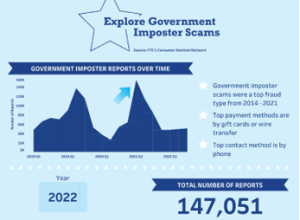
A guide to avoiding visa and immigration scams
A guide to avoiding visa and immigration scams

Ever since the inception of the internet, we have seen a number of major changes that shaped the world that we live in today– from erasing boundaries to fraudulent activities. Where there were a number of advantages, the dark side of the internet developed rather quickly. Newly released Federal Trade Commission data shows that consumers reported losing more than $5.8 billion to fraud in 2021, an increase of more than 70 percent compared to 2021 Online fraudulent activities include Visa and Migration scams by imitating a government website.
The number of visa and immigration applications can fluctuate depending on a variety of factors, such as economic conditions, political relations with other countries, and the overall level of stability in Pakistan. According to documents available with The Express Tribune, 7,65,000 people left Pakistan in 2022, nearly triple the 2,25,000 departures in 2021 and 2,88,000 in 2020.
During this brain drain, a rising crime is visa and immigration fraud. Applying for a visa is a daunting process. It can wind up being a costly, time-consuming, and bureaucratic affair. You might decide to make your life easier by using a travel visa website to expedite the situation. But this opens yet another can of worms – exactly how to tell if a visa website is a scam?
Here are a few things to look out for when trying to determine if a visa website is a scam:
- Check the website’s domain name: Scammers often use domain names that are similar to a government or official visa websites. Be sure to double-check the domain name and make sure it is the official government website for visa applications.
- Look for contact information: Reputable visa websites will have contact information, such as a phone number or email address that you can use to reach out to them if you have any questions or concerns. If a website does not have any contact information, it may be a scam.
- Check for testimonials or reviews: Legitimate visa websites will have customer reviews or testimonials that you can read to get an idea of the experience of other customers. If a website does not have any reviews or testimonials, it may be a scam.
- Check for security measures: Legitimate visa websites will have security measures in place to protect your personal information, such as encryption or a secure connection (https). If a website does not have any security measures, it may be a scam.
- Check the fees: Visa application fees vary depending on the country and type of visa. Be wary of a website that charges significantly more than the official government website or that requests payment before providing any services.
- Check for an official government seal or logo. Visa websites representing official government agencies should have official seals or logos of the respective country.
It’s always best to verify with the relevant embassy or official government website if you’re unsure about a website’s authenticity. For a reliable, authentic, and safe visa and immigration journey, visit https://www.aegimmigration.com/
[1] https://timesofindia.indiatimes.com/world/pakistan/pakistans-brain-drain-situation-aggravates-765000-youths-moved-overseas-in-2022-official-data/articleshow/96205449.cms
* Figure 1 -https://public.tableau.com/app/profile/federal.trade.commission/viz/GovernmentImposter/Infographic
